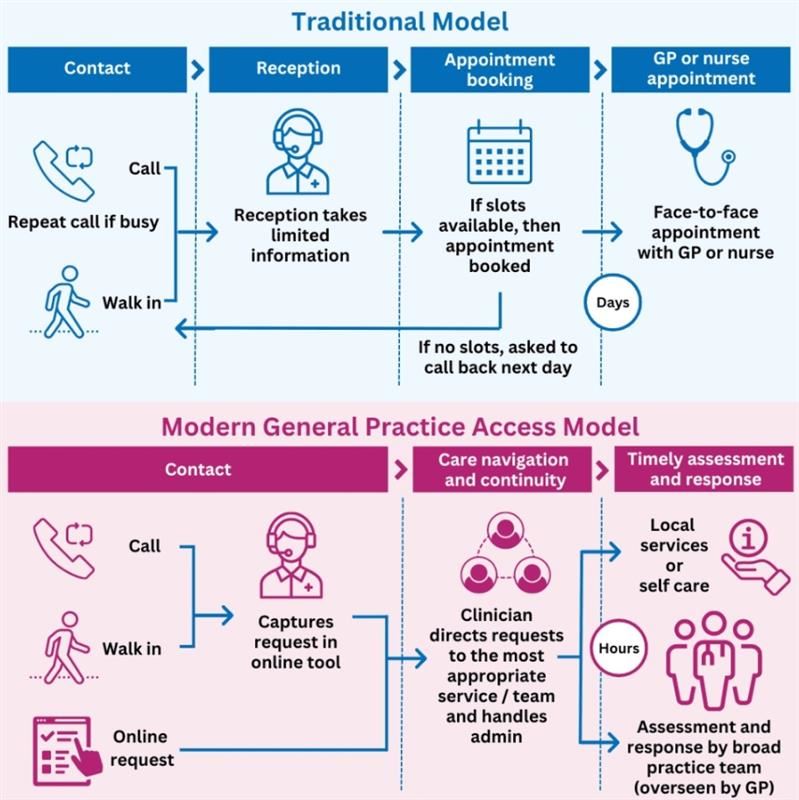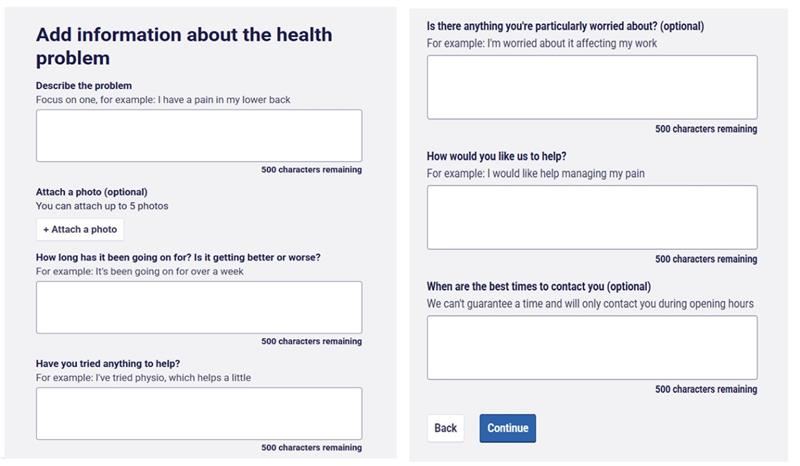Important Patient Update – From 1st October 2025
Non-urgent advice: We are moving to the NHS Modern General Practice model: Triage Model
We wish to share some very exciting news about a significant change to our appointment system that will improve the way our surgery delivers care to all our patients.
GP practices across UK are moving to a ‘Modern General Practice’ model to make access to care and treatment easier for patients and help improve patient satisfaction. This is a national NHS project, and all general practices must adopt the system eventually.
From the 1st October 2025 we are going to trial a Triage model, with adaptations to suit our own patient needs.
We understand that changes in healthcare systems can sometimes be a worry, and we are committed to making this transition as smooth as possible for all our patients.
What is Triage?
Triage is a new system for requesting GP appointments.Instead of a "first come, first served" approach to booking appointments, all requests will be triaged (assessed) first, so that you are directed to the right professional or service at the right time.
This means:
- Safer access to care.
- Fairer prioritisation based on medical need, not just who calls first.
- Faster resolution of problems – sometimes without needing an appointment.
- Better use of the whole practice team (GPs, nurses, pharmacists, physiotherapists, physician assistants, care co-ordinators).
How Does It Work?
- Initial Contact
- Submit a request (clinical and administrative) using the online triage form on our website.
- If you cannot do this, call or visit reception – a receptionist will help you complete the same form.
- You may also be sent a link via email or SMS.
- You can watch a video about how to submit your form here: Patient Flash Demo: How to submit a medical request in Patient Triage – YouTube
- Review
- All requests are reviewed promptly by our clinical triage team – GP and patient services team (usually the same day).
- The GP will decide the most appropriate next step:
- Urgent same-day appointment (face-to-face or phone)
- Routine appointment (within 7+ days)
- Advice by text or call
- Referral to another service
- Response

You will always receive a clear update on what will happen next, who will contact you, and when.
Availability
- Forms available: Monday – Friday, 8am–6.30pm (via website).
- Outside these times: call 111 or 999 in an emergency.
What questions will I be asked?

- The form only asks for a small amount of information; however, this will allow your request to be triaged effectively. Please provide as much information as required.
- You are asked 6 simple questions, 3 of which are optional and do not require an answer, you can also send pictures; however please do not send pictures of any intimate area’s as these will be saved to your medical record.
Appointment Types
- Same day (urgent) → booked by reception after GP triage.
- Within 7 days → for non-urgent issues, booked by reception after GP triage.
- More than 7 days (routine) → planned reviews or follow-ups, booked by reception after GP triage.
- Telephone appointments → often quicker, especially for follow-ups, booked by reception after GP triage.
- Nursing & healthcare team appointments → continue as usual for things like blood tests, cervical screening, wound care.
Who Might You See?
Not every problem needs a GP. Our wider team includes:
- Physician Assistant
- Clinical pharmacists & pharmacy technicians (medication & BP reviews)
- First contact physiotherapist (musculoskeletal issues)
- Care Co-ordinator
- Nurses & healthcare assistants
- Community pharmacy services (“Pharmacy First”)
This ensures you are seen by the right person, at the right time.
Non-urgent advice: Why Are We Changing?
- The primary goal is to improve patient care. By having a GP prioritise and manage queries effectively, we can reduce waiting times and ensure urgent cases are reviewed promptly.
- Growing demand means traditional appointment systems no longer work.
- Triage is a national NHS project to improve access and reduce frustration.
- Benefits include:
✔️ Shorter waits
✔️ Reduced 8am phone queues
✔️ More urgent cases seen quickly
✔️ Better continuity of care for long-term conditions - The staff at Misbourne Practice, along with NHS England (NHSE), have acknowledged the increasing demand. NHSE has recently published a paper (Delivery plan for recovering access to primary care) outlining these concerns.
- There are not enough GP appointments nationally to meet the growing patient demand. To keep the system fair and safe, we need to ensure that GP appointments are reserved for patients who need to see a GP. What a patient wants is not always the same as what they need. Many health concerns can be safely and effectively managed by other skilled members of our team – such as physician assistants, physiotherapists, pharmacists, care coordinators, and other healthcare professionals.
- Triage has been designed to ensure that patients who most need an appointment are able to get one, and to facilitate equity of access to care.
- We understand how frustrating it can be for patients to wait in phone queues to get an appointment, and we are concerned that those who need to be seen are not getting seen at the right time.
- NHSE has stated that there is good evidence that clinician triage and modern online tools make it easier to manage patient requests and involve the wider team, with higher patient satisfaction rates than with the more traditional model.
- To address all the above, we are introducing a Triage Model of care. This means that anyone requesting an appointment or advice will have their request triaged. Our online consultation forms provide us with key information about your problem, so that we can arrange an appointment at the right time with the right person – if needed.
- Finally, it will also allow more collaborative working between our two sites (at Chalfont St Peter and Chalfont St Giles) and allow more flexibility for patients in choosing an appointment where and when it suits them.
- Data from practices adopting this model show most patients and staff prefer it as it improves demand management and leads to higher patient satisfaction.
Key Points to Remember
Key Points to Remember
1. From 1st October 2025, all requests must go through GP Triage.
2. Use our website wherever possible.
3. For those unable to use digital access: phone or walk in and staff will help.
4. Always provide clear and detailed information (e.g., “10-day cough, worsening, chesty, high temperature” not just “cough”).
5. For life-threatening emergencies – call 999.
Non-urgent advice: Frequently Asked Questions
1. Do I need the internet?
No – reception staff can complete the form with you by phone or in person. A friend/family member can also help.
2. What if I have trouble using the new system?
We hope to support patients and their families/carers to get used to the new way of contacting the practice and to become comfortable with this over time.
We will, of course, provide additional support to those patients who are unable to use online resources.
If you do not have on-line access, or experience other difficulties using digital technology, please speak to our patient services team about how we can help you in your usual way.
3. Isn’t this ageist?
No – most of our more senior patients have access to the internet or smart phones and are quite capable of using the simple online system.
We are planning to use our patient services team at the practice to support anyone who needs a bit of extra help.
4. Do I have to share personal information with a receptionist if I ring/walk-in?
It is important you give us as much relevant information as possible so we can ensure your request is triaged properly.
We understand some issues can be sensitive.
Our Patient services team are trained in asking difficult questions, they have signed confidentiality documents and part of our team. Their role is paramount to provide health services to our patients.
5. Can I walk into the surgery to make an appointment?
We strongly discourage patients from walking in to make an appointment. Primary care has never been an emergency service – if a patient needs immediate medical attention, you should ring 111 or go direct to A+E.
If a patient walks in, they will be treated the same as anyone sending an online consult or ringing the practice. The receptionist will ask you for details to complete the form and this will be added to the triaging GP list to be assessed.
It does NOT speed up your enquiry – we manage the requests based on a safety system.
6. What if I prefer not to tell reception my symptoms?
You can complete the online form privately. Receptionists are trained in confidentiality.
7. Can I choose what time I come for an appointment?
For routine planned appointments, we will give as much flexibility as possible (subject to availability).
For urgent appointments, we expect patients to be flexible and will likely be asked to attend at any time between 8am-6.30pm subject to what we can offer. We do NOT have flexibility on these.
For urgent health problems, employers are legally expected to allow employees to attend these (including at short notice).
8. Why can’t I send a request when you are shut?
Primary care remains a Monday to Friday, 8am-6.30pm service. There are other services available for urgent problems outside of this time.
We must manage demand on the practice – our practice team work hard but also need to work within safe working conditions.
9. What about home visits or community care?
These will still be arranged based on clinical need, especially for housebound or vulnerable patients. Use the online form (or call us) to request help, as early in the day as possible. Care coordinators and reception staff will provide extra help if needed
10. Will this affect how I get repeat prescriptions?
No. You can continue to order repeat prescriptions through:
● The NHS App (preferred and quickest method)
● AccuRx Triage via surgery website
● Your pharmacy
11. Will I still see my usual GP?
Yes, where possible for routine care. For urgent issues you may be seen by another clinician if your GP is unavailable.
12. Is my information secure with AccuRx?
Yes. AccuRx is an approved NHS partner and complies with strict confidentiality and governance requirements for use in the NHS. More information can be found here: Accurx | Security.
Page created: 11 September 2025